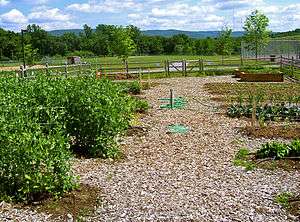Outline of organic gardening and farming
The following outline is provided as an overview of and topical guide to organic gardening and farming:

An organic garden on a school campus
Organic farming – alternative agricultural system that relies on fertilizers of organic origin such as compost, manure, green manure, and bone meal and places emphasis on techniques such as crop rotation and companion planting. Biological pest control, mixed cropping and the fostering of insect predators are encouraged. In general, organic standards are designed to allow the use of naturally occurring substances while prohibiting or strictly limiting synthetic substances.[1]
Organic farming and gardening systems and approaches
- Biodynamic farming
- Biodynamic gardening
- Climate-friendly gardening
- Forest gardening
- History of organic farming
- Organic farming
- Organic gardening (Organic horticulture)
- Permaculture
- Square foot gardening
- Synergistic gardening
- System of Rice Intensification
- Vegan organic gardening
- Wildlife gardening
Principles of organic gardening and farming
- Principles of Organic Agriculture
- The Principle of Health – "Organic agriculture should sustain and enhance the health of soil, plant, animal and human as one and indivisible."
- The Principle of Ecology – "Organic agriculture should be based on living ecological systems and cycles, work with them, emulate them and help sustain them."
- The Principle of Fairness – "Organic agriculture should build on relationships that ensure fairness with regard to the common environment and life opportunities."
- The Principle of Care – "Organic agriculture should be managed in a precautionary and responsible manner to protect the health and well being of current and future generations and the environment"
The ornamental organic garden
- List of flowers
- Organic lawn management
Organic gardening and farming techniques
- Compost
- Biofertilizer
- Intercropping
- Managed intensive rotational grazing
- Multiple cropping
- No dig gardening
- Pollination management
- Sheet mulching
- Square foot gardening
- Succession planting
- Sustainable agriculture
- Weed control techniques (see also 'weeds' below)
- Xeriscaping (water wise gardening)
- Greywater irrigation
- Neglected crops
- Underutilized crops
History of organic gardening and farming
Pests and diseases
An IPM cotton bollworm trap in a cotton field (Manning, South Carolina): a type of integrated pest management.
- Integrated pest management
- Biological pest control
- Disease resistance in fruit and vegetables
- Physiological plant disorders (i.e., plant disorders caused by environmental factors, such as weather conditions, nutrient deficiencies, etc.)
- Nutrient deficiencies
- Plant pathology (i.e., plant diseases caused by fungi, viruses, bacteria, etc.)
- Honey fungus
- Rust (fungus)
- Specific replant disease
Weeds
- Indicator plants
- Dynamic accumulator
Organic publications
Organic organizations
- Organic Crop Improvement Association
- Good Gardeners Association (UK)
- Garden Organic, formerly the Henry Doubleday Research Association (main organisation promoting organic gardening in the UK)
- International Federation of Organic Agriculture Movements (IFOAM)
- Permaculture Association (Britain)
- Rodale Institute
- Soil Association (UK)
- Certified Naturally Grown
- Vegan Organic Network
- World-Wide Opportunities on Organic Farms (WWOOF)
- Carolina Farm Stewardship Association For North and South Carolina, of the US, the leading organic farming advocacy and certification institution.
- Biodynamic Farming & Gardening Association
- Irish Organic Farmers and Growers Association (IOFGA) Organic certification and promotion body in Ireland.
- Maine Organic Farmers and Gardeners Association (MOFGA)
Some important figures in organic farming and gardening
- Lady Eve Balfour
- Louis Bromfield
- Peter Caddy
- Alan Chadwick
- Prince Charles
- Jim Cochran
- Eliot Coleman
- Dr Shewell Cooper
- Bob Flowerdew
- Masanobu Fukuoka
- Howard Garrett
- Geoff Hamilton
- Robert Hart
- Emilia Hazelip
- Lawrence D Hills
- David Holmgren
- Sir Albert Howard
- Dan Jason
- Bill Mollison
- Helen and Scott Nearing
- Michelle Obama
- Airi Ōtsu, Japanese organic farmer
- Prince Philip
- J.I. Rodale
- Viktor Schauberger
- Ruth Stout
gollark: Yes, CONFIGURE them utterly as your domain's nameservers.
gollark: Then configure custom nameservers and put in the LuaDNS ones.
gollark: Go to "management tools" then "nameservers".
gollark: Anyway, LuaDNS have a free plan, so if you sign up there and point your DNS nameservers at them it should work.
gollark: Yes, this is actually not the same thing.
See also
- Aquaponics
- Botany
- Community-supported agriculture
- Farmers' markets
- List of countries with organic agriculture regulation
- List of organic food topics
- Local food
- Organic certification
- Organic cotton
- Organic food
- Organic horticulture
- Organic movement
- Orthodox seed
- Recalcitrant seed
- Terra preta
- Wildcrafting
- Related lists
- List of environment topics
- List of ethics topics
- List of sustainable agriculture topics
- Urban economics
References
- "USDA Blog » Organic 101: Allowed and Prohibited Substances". blogs.usda.gov. Retrieved 6 April 2016.
External links
This article is issued from Wikipedia. The text is licensed under Creative Commons - Attribution - Sharealike. Additional terms may apply for the media files.